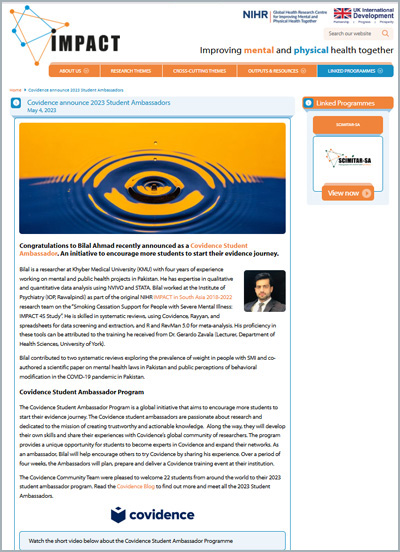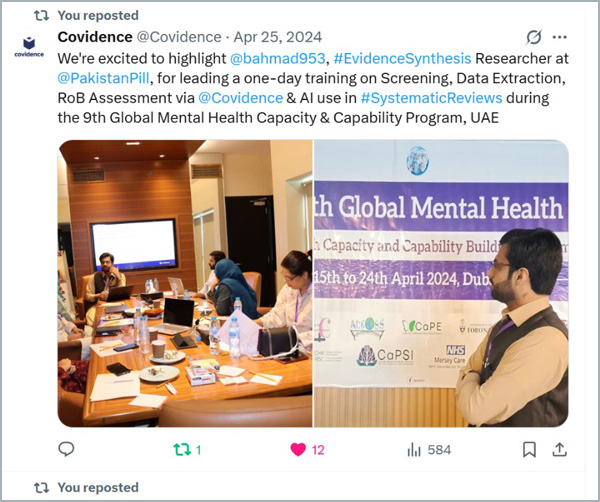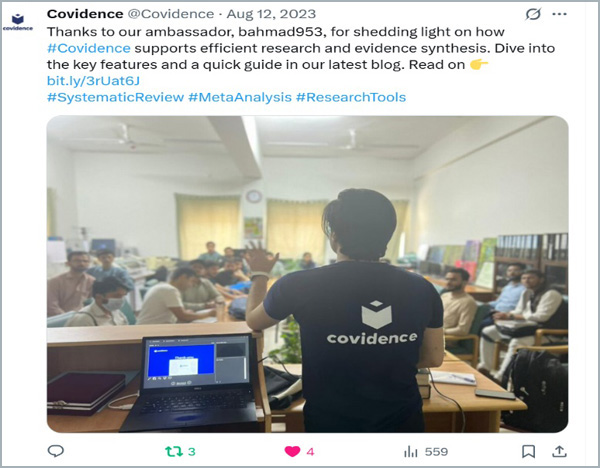Breaking barriers, training champions: My journey in collaborative knowledge communication
Author: Bilal Ahmad Khan
My journey in evidence-based healthcare spans a decade of deliberate bridge-building across disciplines. Beginning with a BS in Psychology at International Islamic University, Islamabad (2014–2018), my undergraduate thesis explored behavioural patterns in smartphone addiction. Through my thesis, entitled ‘Blood group as a biomarker for smartphone addiction and procrastination among university students in Islamabad’, I learned the fundamental power of asking ‘what does the evidence say?’ rather than relying on assumptions. This foundation in research methodology and statistical analysis was transformative.
During my MS in Clinical Psychology at the same institution (2018–2022), I simultaneously practiced as a clinical psychologist, conducting over 200 psychological assessments using standardised instruments and providing evidence-based psychotherapy for depression, anxiety and adjustment disorders. Every patient interaction intensified a crucial question: ‘Am I offering the most effective treatment available or merely following tradition?’ This question became the driving force behind my commitment to synthesising evidence.
Parallel studies in education—a B. Ed. (2018–2019) on leadership and management and an M. Ed. in teacher education (2020–2024) from Allama Iqbal Open University—transformed my understanding of evidence-based practice (EBP). I realised that EBP requires not just individual knowledge, but also systematic capacity-building, institutional culture change and effective pedagogy. As a visiting lecturer teaching psycho-diagnostics and research methods (2019–2020), I learned that teaching is itself collaborative knowledge communication, engaging students critically rather than merely transmitting information.
The culmination of my academic journey came with my MS in Epidemiology and Biostatistics at Khyber Medical University, Peshawar (2022–2025). Here, clinical psychology, teaching experience and statistical expertise converged. I mastered systematic reviews, meta-analyses, risk of bias assessment and GRADE evidence evaluation. My thesis, which examined psychosocial interventions for tuberculosis (TB) patients with common mental disorders, addresses this critical gap. Patients with TB frequently experience depression and anxiety; however, in Pakistan, a NIHR-funded project (NIHR201773), Cognitive Therapy for Depression in Tuberculosis Treatment: A Program of Research to Improve Outcomes for Depression and TB in Pakistan, has demonstrated the feasibility of cognitive behavioural therapy, but the systematic incorporation of psychosocial support into TB treatment frameworks in LMICs remains challenging.
This interdisciplinary foundation mirrors the theme of World EBHC Day 2025: Collaborative Knowledge Communication. Evidence-based healthcare demands fluency in multiple languages: the technical language of researchers, the practical language of clinicians, the accessible language of communities and the actionable language of policymakers.
Understanding evidence synthesis: Why it matters
Evidence synthesis is a systematic process that collects, critically appraises and combines research from multiple studies to provide a comprehensive understanding of specific questions. Rather than relying on individual studies that often contradict each other, evidence synthesis examines all available research, rigorously evaluates quality and draws robust conclusions from the totality of evidence.
Consider a health decision, such as choosing between diabetes treatments or selecting a mental health intervention for your community. Individual doctor experiences may not represent broader trends. While personal anecdotes are valuable, they do not indicate what works for most people. Evidence synthesis solves this by systematically assembling the puzzle pieces that individual studies represent, revealing a complete picture that guides healthcare decisions.
Systematic reviews represent the gold standard for rigorous, transparent reviews that systematically search for all relevant studies, critically appraise quality, extract data using standardised forms and synthesise findings. These follow explicit protocols registered in databases such as PROSPERO to ensure transparency and minimise bias.
Meta-analysis extends this by using statistical techniques to combine results quantitatively, calculating summary effect sizes that represent overall treatment effects with greater precision than any single study.
The trust crisis and the communication opportunity
World EBHC Day 2025 acknowledges a sobering reality I have witnessed firsthand in Pakistan: trust in science has become fragile, with public confidence in institutions eroding under misinformation, disinformation and polarisation.
Democratising evidence synthesis: My ambassador journey
In 2023, I became one of 22 Covidence Student Ambassadors globally and the only one from Pakistan. This role revealed a critical inequity: Covidence and many systematic review tools are free for researchers in low- and middle-income countries (LMICs), yet hardly anyone in Pakistan knew this. I have encountered talented researchers conducting systematic reviews entirely manually, spending months on tasks that software could complete in weeks.

I designed comprehensive training sessions covering the entire systematic review process––from developing search strategies and conducting dual-review screening, to designing data extraction forms, assessing risk of bias, performing quality appraisal following GRADE guidelines and exporting data for meta-analysis. Beyond software operation, I taught critical thinking about evidence quality, transparency in research methods and ethical considerations in evidence synthesis.

I conducted training at the International Islamic University Islamabad, Institute of Psychiatry at Rawalpindi Medical University, Riphah International University and Khyber Medical University Peshawar. In April 2024, I delivered my first international training at the 9th Global Mental Health
Research Capacity and Capability Program in Dubai, teaching mental health professionals from Pakistan about evidence synthesis and artificial intelligence in health research.
The feedback consistently moved me to take action. Participants shared that systematic reviews no longer seemed reserved for elite institutions and they felt confident starting their own reviews. Training changed how they critically appraised methodology rather than accepting published findings at face value. Learning about free tools removed the main barrier to conducting evidence synthesis.

Ripple effects demonstrate the power of collaborative knowledge communication. The researchers I trained completed systematic reviews, several of which were published in peer-reviewed journals. Some have become trainers, teaching their colleagues about evidence synthesis. A community of practice has emerged and people from different sessions now collaborate on reviews, share resources and support each other's development.
Research contributions spanning mental health
My publication record addresses diverse mental health challenges in vulnerable populations. Our meta-analysis on the prevalence of overweight and obesity in people with severe mental illness, published in Frontiers in Endocrinology (2021), revealed disproportionate obesity rates among people with schizophrenia and bipolar disorder, demonstrating that mental health services must integrate physical health screening and interventions.
Our systematic review of traditional healers' interventions for common mental disorders, published in Transcultural Psychiatry (2024), addresses the critical reality in LMICs, where traditional healers often represent the primary and sometimes the only, mental health providers in communities. Rather than dismissing traditional healing, our evidence synthesis examined its effectiveness, barriers and facilitators, exemplifying the World EBHC Day 2025 principles of valuing Indigenous knowledge systems and community co-production.
Our work examining risk perceptions and cultural–religious beliefs during COVID-19 pandemic control in South Asian countries, published in BMC Psychology (2024), demonstrated how evidence synthesis must account for the cultural context.
At the Cochrane Global Evidence Summit in Prague (September 2024), we presented the untapped potential for systematic review automation to reduce 6 million hours spent annually on title/abstract screening via Covidence, emphasising that efficiency gains matter most when enabling more evidence synthesis in resource-limited settings, not just faster publication for well-resourced institutions.
My commitment and call to action
As I complete my thesis and continue working at the Pakistan Institute of Living and Learning, I co-lead the Evidence Synthesis Department and manage many systematic reviews simultaneously. Throughout, I remain committed to the principles guiding my work: faith, unity, discipline. My faith lies in evidence-based healthcare as a force for equity and improved outcomes globally. Unity can be achieved through collaborative knowledge communication, which bridges disciplines, borders and cultures. Discipline lies in maintaining rigorous methods, ethical practices and sustained capacity-building efforts.
I commit to conducting systematic reviews addressing questions genuinely relevant to LMIC contexts, training at least 100 more researchers in evidence synthesis methods, publishing open-access whenever possible, engaging policymakers through policy briefs and consultations, mentoring emerging researchers from underrepresented backgrounds, building sustainable research infrastructure, centring patient and community voices through participatory approaches, embracing diverse communication methods and contributing actively to global EBHC movements.
Conclusion: Communication must cross borders
My journey from undergraduate psychology student, to clinical psychologist, to educator, to biostatistician, to international trainer embodies what World EBHC Day celebrates: individuals worldwide driving healthcare improvements through dedicated commitment to evidence-based practice.
More fundamentally, my journey illustrates that collaborative knowledge communication is not optional or supplementary; it is absolutely essential. Evidence generated but not communicated represents unrealised potential. Evidence communicated only to academics has a severely limited impact. Evidence communicated without respecting diverse knowledge systems, engaging affected communities or adapting to local contexts perpetuates colonial patterns where knowledge flows unidirectionally rather than circulating multidirectionally among global partners.
True collaborative knowledge communication requires speaking multiple languages; crossing disciplinary and geographic borders, sharing power by including marginalised voices; embracing humility; recognising that evidence evolves continuously and contexts matter enormously; building capacity through training rather than hoarding expertise; and prioritising equity to ensure evidence-based healthcare reaches everyone, regardless of geography, socioeconomic status, language or literacy.
As we celebrate World EBHC Day 2025 under the theme of Collaborative Knowledge Communication, let us collectively commit to closing the research-to-practice gap through better evidence communication. Together, through communication that respects diversity, builds capacity, shares power, embraces humility and prioritises equity, we can build healthcare systems that truly serve all people, ensuring that every patient everywhere receives care informed by the best available evidence, delivered with cultural sensitivity, adapted appropriately to local contexts and continuously improved through ongoing evidence generation and synthesis.
This is my commitment. I invite everyone to join this movement towards truly global evidence-based healthcare, where knowledge flows freely, communication crosses borders and improved health outcomes reach every community worldwide.
To link to this article - DOI: https://doi.org/10.70253/OBWJ6595
Disclaimer
The views expressed in this World EBHC Day Blog, as well as any errors or omissions, are the sole responsibility of the author and do not represent the views of the World EBHC Day Steering Committee, Official Partners or Sponsors; nor does it imply endorsement by the aforementioned parties.

Bilal Ahmad began his research journey in 2018, followed by his work in evidence synthesis in 2021. In 2023, he became a Covidence Student Ambassador, and in 2025, he was appointed General Manager for the Department of Evidence Synthesis at the Pakistan Institute of Living and Learning.
Bilal completed his MS in Clinical Psychology from the International Islamic University, Islamabad, in 2022, and his MS in Epidemiology and Biostatistics from Khyber Medical University, Peshawar, in 2025. With this unique combination of public and mental health expertise, he aims to contribute to psychiatric epidemiology in low- and middle-income countries, particularly in the South Asian region.
We are proud that Bilal Ahmad has become an Evidence Ambassador from Pakistan and will contribute effectively to building capacity and capability in this region, where evidence synthesis awareness is greatly needed, under the visionary leadership of Professor Nusrat Husain. Bilal Ahmad is deeply grateful to his mentor, Professor Nusrat Husain, Professor of Psychiatry at the University of Manchester, United Kingdom."